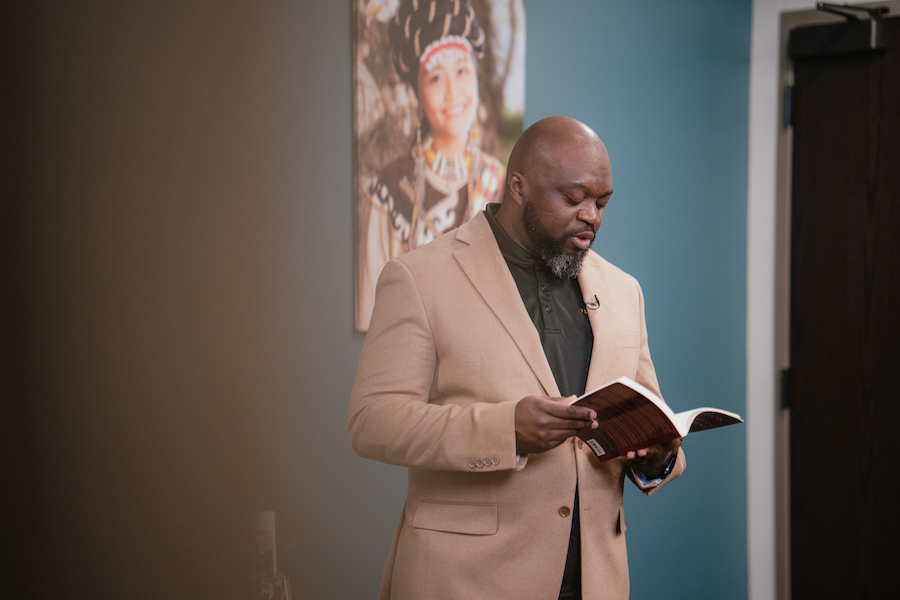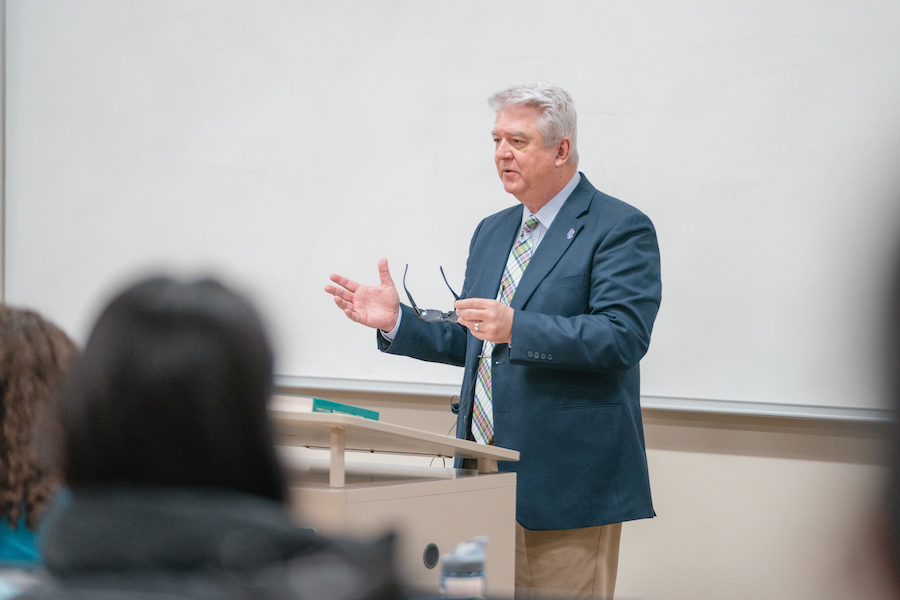Evangelism on purpose: How Joshua Crisp makes evangelism a priority at his midwestern church
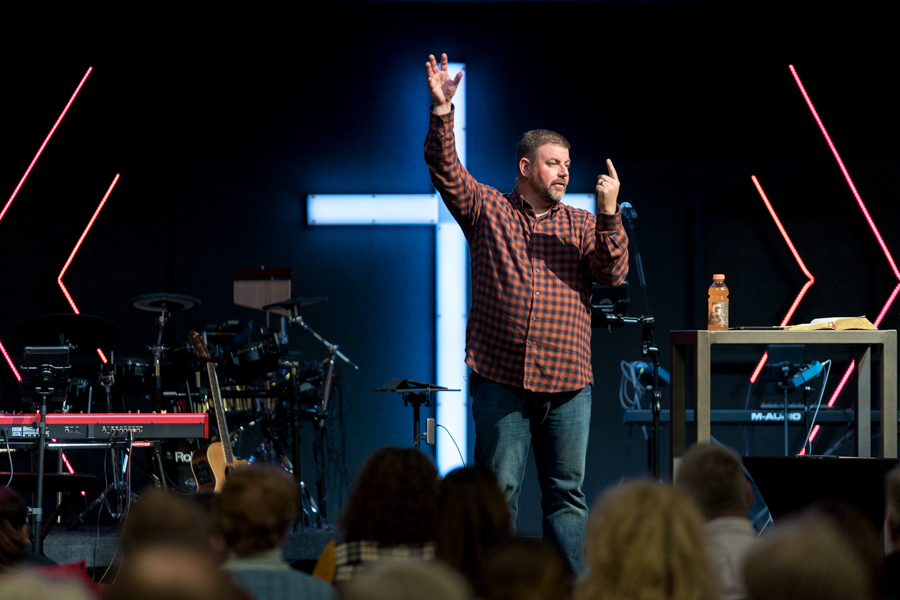

Editor’s note: this article appears in the Spring 2022 issue of Southwestern News.
Gary Wells isn’t the kind of man you’d think would thrive on a mission trip to Kenya where evangelism was front and center. Reserved and quiet, he wasn’t accustomed to regularly sharing his faith.
But that changed in Kenya earlier this year, where the team from his church hit the streets to share the Good News in a nearly constant manner. Wells shared the Gospel multiple times and led people to faith in Jesus.
“We had three or four Kenyans with us translating for us,” said Wells, who is semi-retired. “They pretty much led the way, so you didn’t have to figure out who to talk with. They would ask people if they wanted to hear what was going on. If someone had no interest, they’d just move on. Then, out of pure repetition, it simply got easier.”
Wells’ surprising evangelistic fluency in Kenya didn’t come by accident. His pastor, Southwestern Seminary graduate Joshua Crisp (’16), had planned for it and put him in a situation where he could get practice in a less-threatening manner. In less than two years as the church’s lead pastor, Crisp had been shepherding the entire congregation toward this kind of intentional evangelism. The mission trip to Kenya was simply the latest step in this disciple-making process.
When the team members returned to First Baptist Church of Bethalto, Illinois, Wells’ words to the congregation during their testimony time were simple: “If I can do it, you can do it. You don’t have any excuses anymore.”
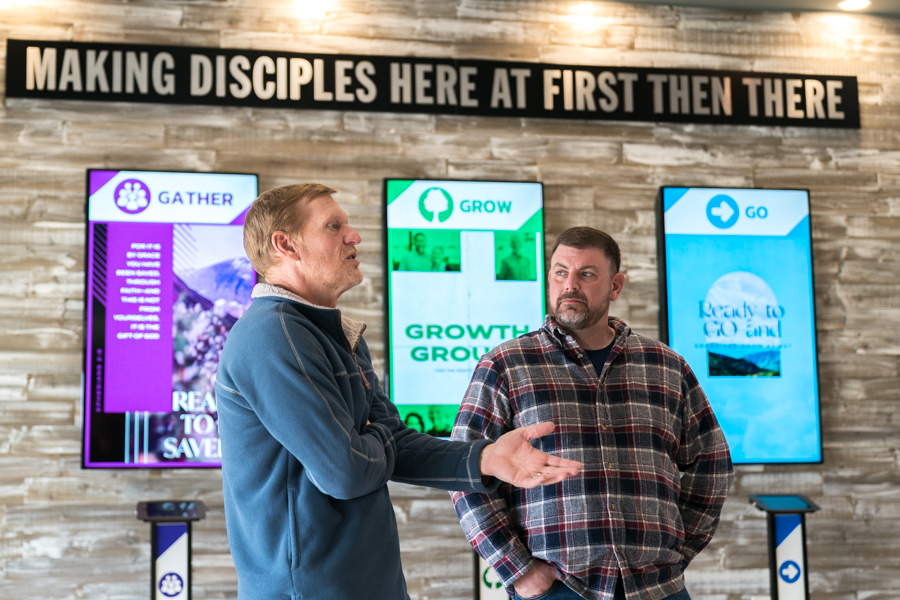
AN INTENTIONAL MINISTRY OF EVANGELISM
Just take a quick look around the gym where the people of First Baptist Church worship weekly and you can see the intentionality of Crisp’s ministry firsthand. Near the church’s stage sits an easel with a sign reading, “Gospel Conversations,” where congregants can mark when they’ve shared the Gospel during the week.
On the back wall, you’ll find a nicely designed poster describing the church’s 10-year goals:
• 10,000 Gospel conversations;
• 500 people baptized;
• 300 new members;
• 1,000 people on mission projects and trips;
• 5 church planters trained and sent out;
• 1,000 people saved;
• 250 members lead others to Christ;
• 25 growth groups started; and
• $500,000 given to church planters and missionaries.
At the welcome center outside of the weekly worship gathering, worshipers can pick up a simple card where they can write their “top five” people whom they are praying for opportunities to share the Gospel.
Everything in the building seems to point to one overriding focus, all encapsulated in the church’s mission statement: “Making disciples here at first then there.”
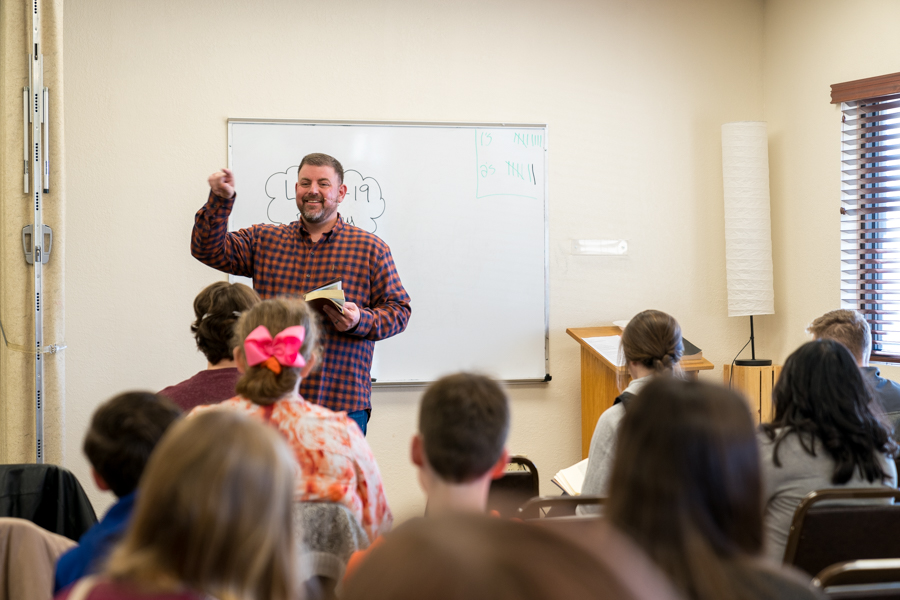
Crisp pursues his leadership at FBC Bethalto, in much of the same way he did as a church planter in Indianapolis—with a single-minded focus on evangelism.
“When I put Gospel conversation boards up every single week, there is an expectation that I’m supposed to be intentional with my faith,” Crisp said. “When the pastor tells me I’m supposed to have a top-five list of people I’m telling my story to, that’s being intentional. If you go to Africa with me, you’re going to be sharing the Gospel. And then when you come back, you’re going to do the same thing here.”
Crisp focuses on three elements in his efforts to make intentional disciples. First, he trains people to share their testimonies. Second, he shows them how to communicate the Gospel using a simple technique called, “The Five Fingers.” Finally, Crisp encourages everyone—including himself—to identify a list of people with whom they are sharing the Gospel.
AN INTENTIONALITY BORN FROM HIS OWN STORY
Crisp’s passion for evangelism comes from his own testimony, he says. He grew up in church and came to faith at a church camp when he was 15, yet Crisp would be the first to say he wasn’t living like a Jesus-follower.
“I moved out of the house, and then started doing stupid stuff,” Crisp said. “I became an alcoholic pretty much overnight, started living wild ways.”
At age 24, Crisp joined the United States Army, a decision that eventually shook his spiritual life. As he arrived at his first duty station in Fort Benning, Kansas, he received orders to go to Iraq for a year.
Crisp said: “That’s when God really grabbed me and said, ‘You’re not living right. You’re a child of mine, but you’re being disobedient. You’re being a prodigal.’”
At that point, God gave Crisp his life verse: “Haven’t I commanded you: be strong and courageous? Do not be afraid or discouraged, for the Lord your God is with you wherever you go” (Joshua 1:9, CSB). Over the next year, as Crisp served in Iraq, God got his attention through the loss of two friends who were serving with him.
God continued to work on Crisp, first through a dating relationship and eventual marriage to a strong Christian woman, and then a friendship with an Army captain on his second tour in Iraq. By the time he wrapped up his four-year enlistment in the Army, he was ready for a fresh start with God.
“I knew I had to make some changes before I went back to my new wife,” Crisp said. “That’s when I said to God, ‘I don’t want to drink anymore. I don’t want to party anymore. I have a wife now. All I want to do is focus on You, and You tell me what You want me to do.’”
But, Crisp says his long battle with alcohol and an ungodly lifestyle is a big reason why evangelism became such an important part of his life.
“I always put myself in the position of lost and unchurched people,” Crisp said. “I have a heart for them. There were times I was plastered at three or four in the morning, and I wanted a man to go knock on my door and say, ‘What are you doing?’ It was lonely at times.”
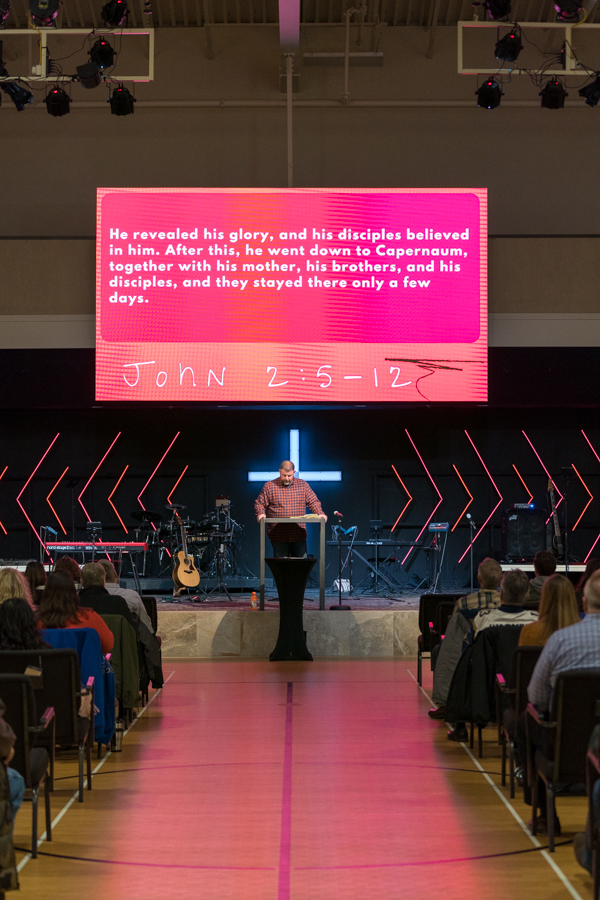
SOUTHWESTERN FANS EVANGELISTIC FLAME
In time, Crisp recognized God was calling him into ministry and started looking for a seminary program. When he learned Southwestern offered classroom credits for mission trips, he was hooked. Getting credits for sharing the Gospel seemed like a dream come true.
“After that, we knew where we wanted to be,” said Crisp, who started his studies at Southwestern in 2014. “We just fell in love with what they were doing.”
While at Southwestern, Crisp took mission trips to both Baltimore and Madagascar. Already feeling led toward church planting, those experiences exposed him to church planting practices both in the U.S. and abroad.
Crisp also appreciated the opportunity to learn ministry from professors who were active in serving local churches. He particularly noted the ministries of Matt Queen and Tommy Kiker.
“Those guys don’t just talk about ministry; they’ve done ministry,” Crisp said. “They were very real and raw. Dr. Kiker didn’t give fluff. He said this is how pastoral ministry is going to be. It’s going to be tough. It’s going to be enjoyable and joyful, but it’s also going to be hard.”
“From Dr. Queen, I learned a lot about how to share the Gospel. I learned different tools and different traits that he taught in his evangelism class. We became friends. I started picking his brain, saying, ‘I’m going to plant a church. What do you think of me doing this or that?’ Then he started not just being a professor—but he started pastoring me through these decisions,” Crisp says.
The two stayed in touch after graduation, and they’ve ministered together in congregations where Crisp has served.
“A lot of students, when they come in to one of my classes at Southwestern, they’re very much focused on the grades,” Queen said. “Josh did fine and graduated, so he made the kind of grades
that he needed to make. But Josh was really concerned with learning the how to [of ministry].”
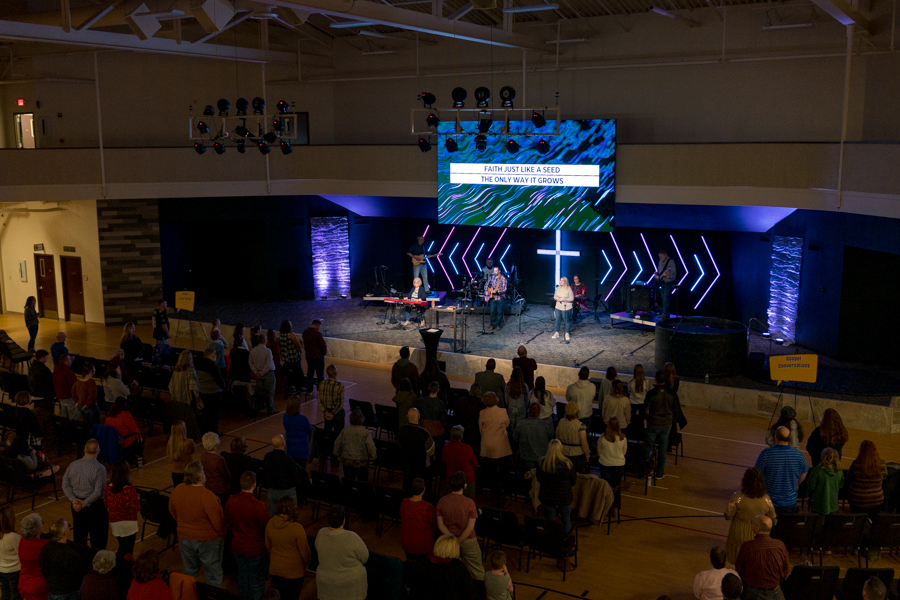
CHURCH PLANTING IN INDIANAPOLIS
During Crisp’s first year at Southwestern, he learned about the North American Mission Board’s Send North America initiative, which helps Southern Baptists plant churches in the most influential and unreached cities on the continent.
“I didn’t want to be a traditional pastor, sitting behind a desk with a suit and tie,” Crisp said. “That didn’t resonate with me.”
His pastor back in Illinois, Sammy Simmons (’03), had been casting a vision for church planting in Indianapolis. As Crisp learned the city was 90 percent lost and of the need for churches, God broke his heart for the city.
After graduating from Southwestern in May 2016, Crisp and his young family headed to Bargersville, a small bedroom community of 10,000 just south of Indianapolis. With only three churches and a total average attendance of 300, the suburban community desperately needed Gospel-preaching churches.
Immediately, Crisp focused on an intentional plan of evangelism. He shared the Gospel everywhere he went. He taught the new church plant about personal evangelism, using practical tools that simplified it for lay leaders.
Crisp also invested in the community, building relationships with everyone from city leaders to first responders to the service staff at restaurants he frequented.
As God blessed these relationships, Crisp earned opportunities to share the Good News. When his evangelistic efforts and the efforts of his congregation bore fruit, other churches in the area—and around the state—asked Crisp to teach them how he was doing it.
John Horn (’86), a Southwestern alumnus, trustee, and the team leader for church health at the State Convention of Baptists in Indiana, worked with Crisp frequently while he was in Indiana. He calls Crisp a natural evangelist.
“I’ve gone and had breakfast with him and seen how he can just be friendly with a waitress. And before you know it, he’s got her in a Gospel conversation,” Horn said. “She’s sharing things from her heart and wants him to pray with her. That’s just the way he is.”
Crisp believed he was in Indianapolis for the long haul, and he had great dreams for what laid ahead. The church plant was thriving—even throughout 2020 when COVID restrictions made meeting more difficult.
But Crisp began sensing God wanted him elsewhere.
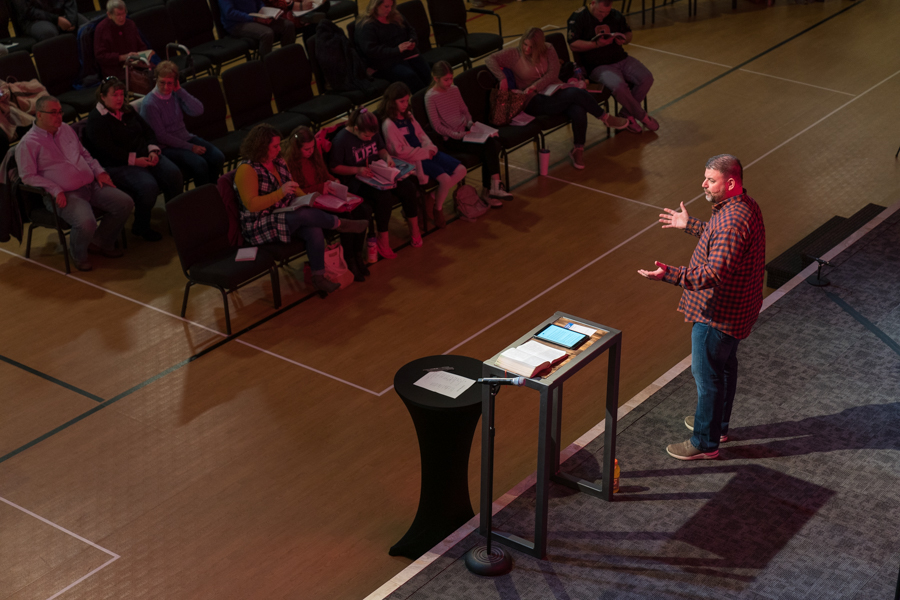
A GOSPEL-SIZED MOVE TO ILLINOIS
In November of 2020, Crisp accepted a call to First Baptist Bethalto. The community, which describes itself as a “village” on its website, is a small town of 10,000 about a half an hour northwest of St. Louis, Missouri. Like many small towns in the Midwest, you’ll find churches throughout the community. Many, including FBC Bethalto when Crisp arrived, were struggling.
Chris Slusser, who was a member of the pastoral search team that called Crisp, says part of the reason the church asked him to serve is that they believed he would push the church into new directions.
“This has been a great church,” Slusser said. “But we’re slowly dying. Attendance was decent, but we were dying a slow death over 10 to 20 years, if we didn’t hire the right person. I wanted to hire someone who would shake things up, turn the church upside down, and push us way out of our comfort zones.”
Less than two years into his pastorate, that’s what Crisp is doing. He has leaned into his experience as a church planter to cast a vision with evangelism at its center. Crisp has led the church to pursue aggressive 10-year goals that would have been unimaginable just two years ago.
Despite the ambitious nature of those goals, the heart of Crisp’s ministry has been working one-on-one with the church’s leaders, helping them understand how to do evangelism. That’s meant multiple conversations over coffee or lunch where he compares notes about top-five lists and testimonies. Then he asks them what’s getting in the way of having Gospel conversations with those on their lists.
But maybe most importantly, Crisp shares his own stories—stories about Gospel conversations in his own life.
“As much as I’m talking about it every single week, I’m doing it,” Crisp said. “If I haven’t had a Gospel conversation, I’ll go somewhere and have one.”
“Because they’re everywhere.”
Tobin Perry is a writer for Southwestern News.


